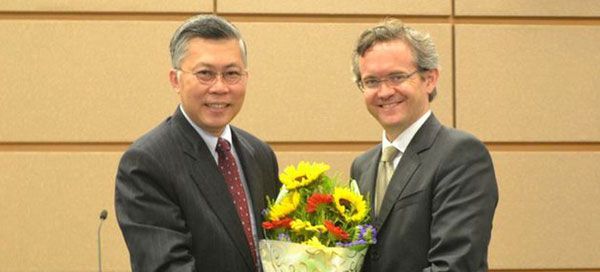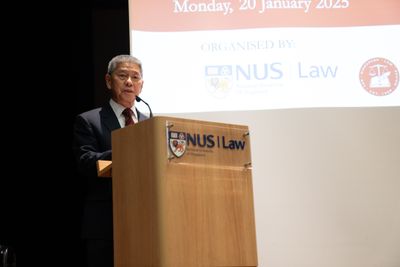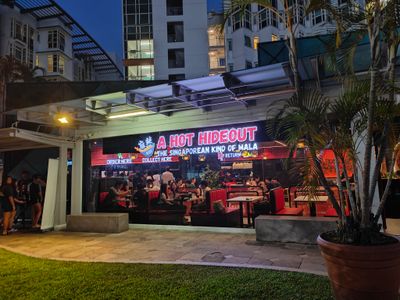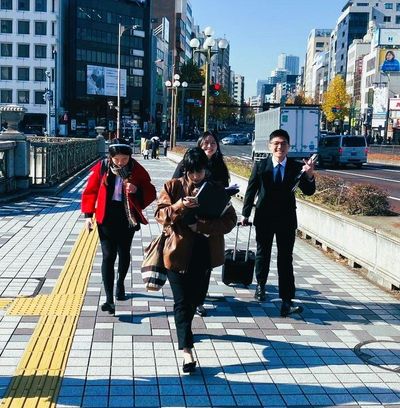
On a little red dot, a factory of sorts churns away faithfully in its ceaseless, daily humdrum. Here in “Disneyland with the Death Penalty” (as the naysayers call it), that ageless factory rumbles on in regurgitating ennui, machines grinding, workers chattering, all in endless, ceaseless toil. The products: young urban professionals (also known in 1980s America as Yuppies). Yuppies, or in our case – lawyers. Lawyers, the products of the efficient and elite machine that is NUS Law. Lawyers, most of whom have emerged from a Faustian exchange of their very beings, only to be decked out in suits and ties for an eternity, it seems. A fraction of this eternity is also lived out each summer.
—
You see, there are many brilliant, beautiful thoughts that summer conjures in our minds. And then, there is the hollow dread of back-to-back internships. Internships galore, the click-clack of heels and polished shoes against polished marble floors, heaps of legal research and assignments momentarily resurface like a recurring LAWR nightmare, email drafts, and if fortuitous maybe the occasional hearing. For the rest of us not bumming around, we happily commit sacrilege by heading back to law school (!), and taking part in events such as the Criminal Justice Conference (CJC) 2013. I reckon we come to conferences in law school expecting comprehensive amalgamations of the stuff (sometimes we say “fluff” too!) we learn in school with the colorful war stories and practical legal advice generously offered by returning alumni or renowned local legal minds. All of those things, I certainly did leave the conference with. What I didn’t expect to walk away with was an inspiration-earworm of sorts, or pep talk if you may, that got me thinking. A lot. About life.
 The Honourable Attorney-General Steven Chong, S.C. presented the keynote address at the Criminal Justice Conference 2013.
The Honourable Attorney-General Steven Chong, S.C. presented the keynote address at the Criminal Justice Conference 2013.
The AG kicked off the conference by highlighting the greater goal, of both his chambers and the local legal fraternity, to improve access to justice, which by the way is much more than just the question of whether an accused person can afford or is provided legal representation. The AG highlighted that “there is a significant difference between legal representation and competent and adequate legal representation,” which I must agree, differ in meaning and effect as much as an orang utan differs from an orange. Essentially, greater accessibility to criminal justice is not merely a function of ensuring that the various stakeholders in the criminal legal process discharge their duties dilligently. It is also determined by the equity of the criminal legal framework as a whole, and the values and beliefs that the framework embraces. The AGC itself has invested much in catering to special needs offenders with intellectual disabilities or mental disorders. Remember the controversy and debate in our “PP v Juminem” and “Ong Pang Siew v PP” genus of cases? Well, the AGC recently launched a pilot project to administer a simple screening test, the Hayes Ability Screening Index (HASI) to identify persons with intellectual disabilities so that they can receive appropriate assistance from volunteers (Appropriate Adults) during police interviews. Strange as the name sounds, these Appropriate Adults play pretty critical roles. They facilitiate the communication of information between investigation officers and accused persons. Anyone vaguely involved in any legal work concerning evidence and the Criminal Procedure Code should find this familiar. Quite obviously, this promising initiative serves to enhance the reliability of statements taken from persons with intellectual disabilities.
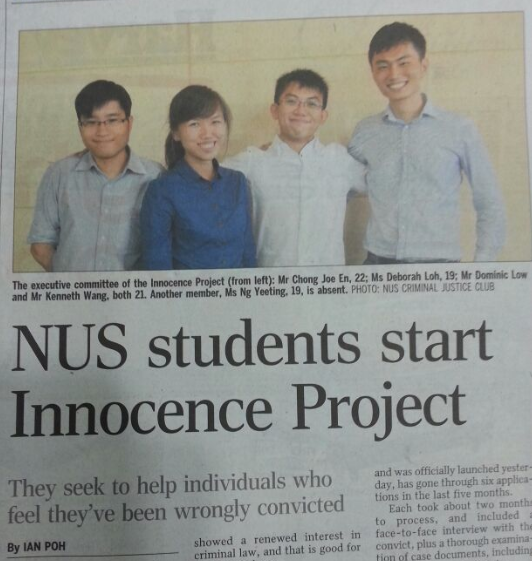
A subsequent post on the Innocence Project will be up soon!
Thankfully too, the local stakeholders, the law firms, and law schools all appear to be rocking the same beat. Closer to home, the Innocence Project (IP) initiated by our very own NUS Criminal Justice Club needs no further introduction. The AG himself, acknowledged that such initiatives reflect a renewed interest in the criminal law, which is good for the system here.
Good for the system: A professor once remarked that despite our stellar education at NUS Law, most of us will never understand first-hand the intricacies and ramifications of the law, at least until we enter practice proper. William Gibson, the author of the aforementioned article (Disneyland with the Death Penalty) describes Singapore as a picture-perfect portrait of the archetype “Zero Tolerance” state of justice keepers. At least from an outsider’s point of view, it is pretty much zero tolerance indeed. Yet, surely this alleged zero tolerance for heinousness must also come with immense responsibility? On this note, renewed interest in the criminal law is certainly advantageous for the system here. Still, perhaps the bigger and sweeter victory yet is greater student involvement more avenues for personal interaction/groundwork. Such initiatives will definitely prove to be particularly beneficial for us law students who will now (with mandatory pro-bono hours too!) get to see the “human”-side (as some would say) of the law.
While commenting on student involvement in pro-bono work and these criminal justice initiatives, the AG himself very lightheartedly provided some personal insights on student life. If I may add, these nuggets of advice from the wise man himself can and will thoroughly shape our approaches to our legal education:
Clarity. AG Chong went to NUS law because he wanted to be an advocate. He was absolutely convicted and entirely resolved to see that aspiration materialize eventually. Unfortunately, I’m sure a majority of us would agree that this very clarity is almost always eroded in the course of our strenuous legal education.
Ownership. Perhaps the former (clarity) is inextricably congruent with the latter (ownership). AG Chong stressed that taking ownership of and in our education/ work will do us much good in learning fast and learning right. This is especially so in our capacity as law students/lawyers-to-be, where a safety net for avoidable mistakes basically, well, doesn’t exist. 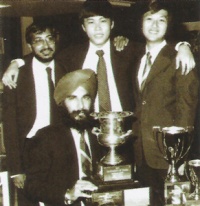 “Doing the moots was almost like taking up another module. It was equally challenging even though there were of course, no credits.” (AG Chong)
“Doing the moots was almost like taking up another module. It was equally challenging even though there were of course, no credits.” (AG Chong)
Initiative. Of course, as part of the legendary 1982 Jessup Moots winning team, AG Chong reminded us to take interest in our learning and volunteer to participate in activities that would lengthen and deepen our ability and appreciation of our legal work.
Rest. Quite surprisingly (apologies if you aren’t surprised), AG Chong was more than happy to declare that he never did a single – no, really, not even one – internship during his summer breaks as a student in NUS. He stressed the importance of rest and relaxation during the summer. Of course, my theory is that an over-achiever and high flier like him would have been inexorably exhausted by the academic semesters anyway!
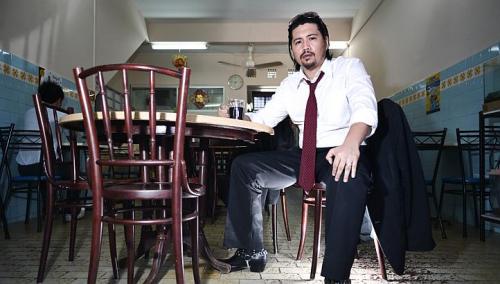
(Photo Credit: Straits Times, 16 February 2013)
Besides engaging the AG on the new initiatives in the local criminal justice system, the participants also spent much time in smaller groups with different panelists to discuss their matters pertaining to pro-bono criminal justice work. The distinguished panels comprised, Mr. Amarjeet Singh SC (Khattar Wong and Partners), Mr Josephus Tan (Patrick Tan LLC), Mr Gopinath Pillai (LawSoc) and Sunil Sudheesan (RHT Law), spirited forerunners in local pro-bono criminal justice work. Much time was spent discussing the challenges they faced in helping people that society didn’t want to help, or as Josephus put it, people that “society had failed” to begin with. Somewhere in between the lofty policies and ideals we have constructed, some have fallen through the subtle cracks into places where neither they nor us want them to be in. What were we gonna do to help them? At this juncture, stop, pause and think about your early days in law school. Perhaps even the squeaky bum moments before you entered the interview room with the all-but-cliche interview question of questions ringing out in your concaving mind, “Why do you want to study law?”. Quite apart from sounding like the noble, Messiah-like purveyor of justice riding a white stallion of liberation towards enslaved captives of the land, this was (and still is) my answer: I was particularly keen on doing work in the likes of the International Justice Mission, and I still dream to enter a third-world country one day and do my part. Part thinking about my ‘dream’ and part listening to the panel, I pondered the question that Josephus posed (paraphrased), “What about the rest of us? Did we really want to do pro-bono work, was that really why we wanted to enter NUS Law?” Or perhaps, more importantly, do we still want to do the very things we raved about?
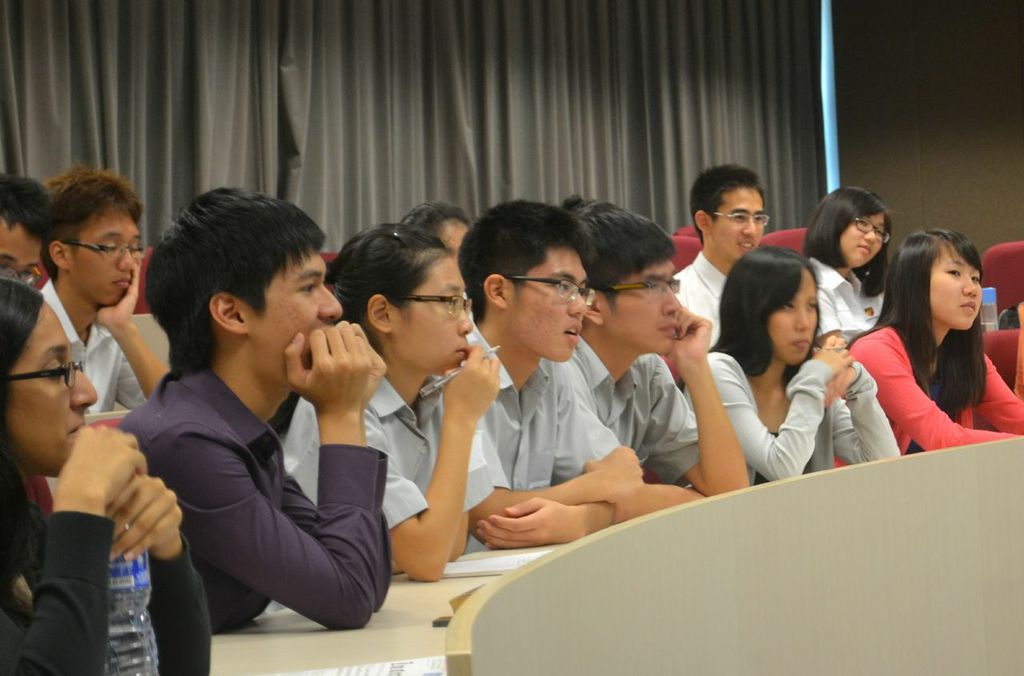
Law students from SMU and NUS, JC Polytechnic students listen intently to Mr Armajeet Singh S.C. (former Judicial Commissioner) at the breakout session as part of the panel on the “Accessibility of Criminal Justice”.
What the panel shared, the war stories they told, and the advice they gave brought everything down to one single fundamental: the ‘human-ity’ of the situation we face as lawyers-to-be. The problems that these ‘criminals’ (so to speak), or troubled delinquents face are not merely legal or illegal, black and white matters. Without stereotyping, the panelists shared that at the heart of each offender probably lies a broken family, distorted childhoods that we can never comprehend, and myriad burdens that we may never bear on top of our #firstworldproblems. The good news is also that these offenders do not always require us to be superheroes, if we haven’t realized by now. Not every case needs necessarily to be an Ong Pang Siew v PP death-to-life rescue from the clutches of Lady Justice. As Josephus stressed, “they just need your time”, to listen to them and give simple legal advice, who to look for, who to call, which organization etc. The panel went on to share that most of us (even the students in tertiary education currently) can do our part at legal clinics in basic yet vital ways. I think its pretty remarkable that once we’re cured of our myopic approach to pro-bono work, we start to see that it pro-bono be more ‘humanized’; we begin by appreciating ‘clients’ as struggling citizens just like us, and work together with them to improve their situations one small step at a time… As Josephus said, “its emotionally rewarding.” There is certainly more to criminal law than money.
—
The second day of the conference saw much discussion on criminal minds and the implications of medical unsoundness/illnesses. A panel comprising a variety of professionals including Dr. Chu Chi Meng (Ministry of Social and Family Development), Dr. Kenneth Koh from the Institute of Mental Health) and Mr. Amarick Gill (LawSoc) contributed to the discussion. I believe most of us can understand the difficulties of criminal procedure and the admissibility of statements having studied the myriad cases involving allegedly mentally unsound offenders. One of the initiatives mentioned above and addressed by AG Chong is the HASI, which seeks to confront this existing, possible hindrance to justice in the Criminal Law. In fact, HASI is merely part of the larger picture: getting aid for unsound offenders truly enhances the trustability of the investigation process because unsound offenders are now conscientiously taken care of so that they do not confess flippantly, and also so that they eventually understand the repercussions of whatever statements they are making.
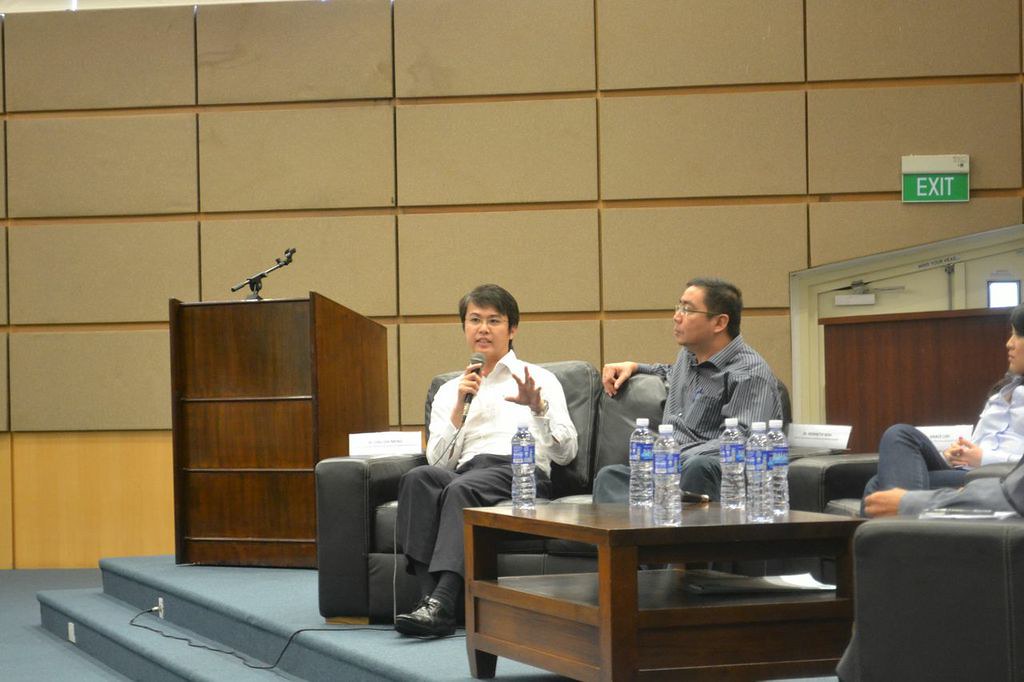
Having gone through the Criminal Law module myself, I do believe it might be edifying for first years to appreciate these medical and judicial perspectives on the matter of prosecuting potentially mentally unsound offenders in concurrence with the Criminal Law module. Practically, these issues also provide a window into the plethora of problems faced by the various role players in criminal law and enable us to understand the position of each stakeholder e.g. lawyers understanding the police investigators better. An interesting second segment of the day also united the prosecution and defence, together with a representative from the Singapore Police Force. The panel embarked on a deeper inquiry and exploration of the local investigation-trial process and how it is currently being carried out. The discussion brought up many interesting points, especially as the prosecution enlightened us on the many important details and steps in information gathering. Interestingly, the difficulties lie in the ‘chicken-and-egg’ conundrum plaguing the prosecution’s roles, as the many crucial lessons imperative for a prosecutor (which is not experienced first-hand in law school) can only mostly be learnt once the rubber hits the road.
 DPP Mohamed Faizal Abdul Kadir, “As lawyers, it is important to understand what happens in the police investigation stage; law school doesn’t teach you about all these things per se. The way that police officers gather information is very important – young DPPs may not even don’t know these things – you learn as you go along.” (To his left, former lawyer & current Deputy Superintendent of Police, Gail Wong).
DPP Mohamed Faizal Abdul Kadir, “As lawyers, it is important to understand what happens in the police investigation stage; law school doesn’t teach you about all these things per se. The way that police officers gather information is very important – young DPPs may not even don’t know these things – you learn as you go along.” (To his left, former lawyer & current Deputy Superintendent of Police, Gail Wong).
—
I mentioned internships and the Faustian exchange of our souls for a lifetime of lawyering above. Also, remember ‘Yuppie’? The band, Switchfoot, sang a song titled “Happy is a Yuppie Word”. In the chorus, the lyrics go: “Happy is a yuppie word/ Nothing in the world could fail me now/ It’s empty as an argument/ I’m running down a life that won’t cash out.” Switchfoot intended to tell the world that rat-race runners – the yuppies – seem no longer to understand what the word ‘happy’ means anymore. The band suggests that such people would likely see their lives culminate in grand nothingness – lives “that won’t cash out”… Maybe school has become that ominous factory of cyclical monotony for you, the study of law appears void of meaning. Maybe the life of suits and ties allures you, even the pecuniary heaven that awaits, but the present struggles and the internships wear you out; you’re barely making it out alive of each semester the skin of your teeth. The better alternative may be to stop living for ourselves and discover the greater treasure in living for and with others. Even the cheesy website for law school tips, SurviveLaw says this: “Whatever you do, don’t race to the finish… but by taking law school at a sprint [you] miss out on all the good bits that just cannot be slotted into a busy timetable: the social events, the careers functions, the extra-curricular activities and the volunteer work.”
Food for thought for the summer ahead?
Article by:

Pictures graciously contributed by the NUS Criminal Justice Club.

